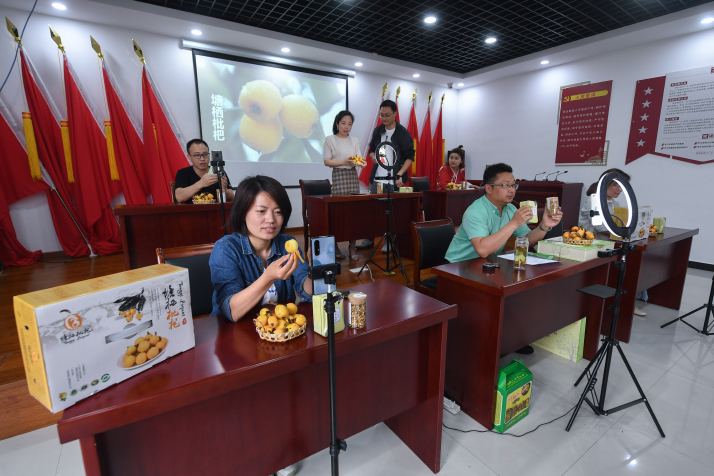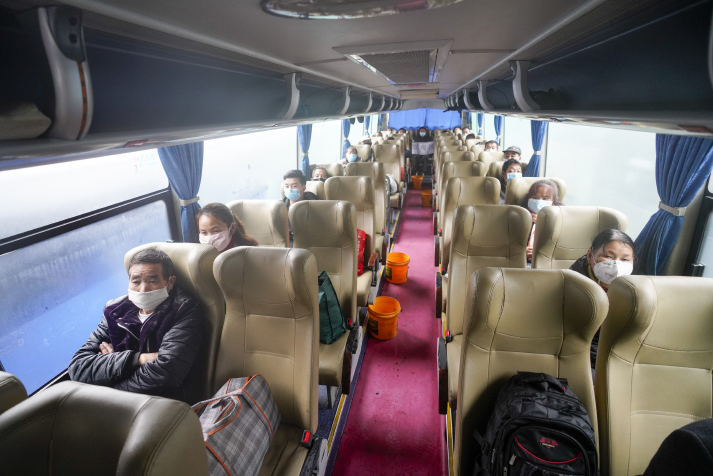| Business |
| China supports enterprises and individuals to counter epidemic-induced headwinds | |
| Besides facilitating businesses and introducing tax and fee reductions for enterprises, the government has given support to the most-affected groups including migrant workers, graduates and farmers | |
|
|
 Loquat growers and e-commerce sellers promote loquat products via live-streaming under the guidance of professionals in Tangqi Town of Hangzhou, Zhejiang Province in east China, on May 9. The local government has organized e-commerce live-streaming classes for them to develop skills for online promotion (XINHUA)
After resigning and returning to his hometown Da'an County in Hunan Province in central China for a new job at the end of last year, 23-year-old Tian Wei met with difficulties in finding a new job due to the outbreak of the novel coronavirus. However, the predicament did not last long. With the help of the human resources department of the local government, Tian went to work for automaker BYD in Changsha, capital of Hunan, in car model production in March when enterprises across the country started to resume production. "I once did similar work in Guangdong Province, south China. After joining BYD, I got about 2,100 yuan ($296) in around two weeks. That met my expectations," Tian told Hunan Daily. According to him, before taking up his new job, he along with other new staff had been sent to a health examination by the local government. BYD in Changsha resumed production on February 10 after the extended Lunar New Year holiday. Despite challenges caused by the delayed return of employees, shortage of raw materials and suspended transportation, it managed to resume work with the help of the local government, according to the company. To ensure stable economic performance amid the epidemic, the central and local governments in China have provided consistent support over the past months to enterprises and individuals to resume business activities and overcome virus-induced difficulties. Besides facilitating businesses and introducing tax and fee reductions for enterprises, the government has given support to the most-affected groups including migrant workers, graduates and farmers.  Staff of automaker BYD work on the assembly line in Xi'an, Shaanxi Province in northwest China, on February 25 (XINHUA)
A boost to businesses After the epidemic forced people to stay indoors, Laixianghui Dumpling, a restaurant chain based in Beijing, saw its business dwindle. But it was able to restore half of its normal delivery business by the May Day holiday, though the number of people dining at the restaurant was still only one third of the normal, Wang Tingjun, Chairman of the company, told Beijing Review. "With the support of the government of Xicheng District, we have opened roadside booths with processed food that can be easily cooked. That brings a revenue of around 7,000 yuan ($988) per day to one of our restaurants in the district," he said. While roadside booths were limited to prevent occupying pedestrian lanes, many regions eased the control during the epidemic to support the affected businesses. Like Laixianghui, many small and medium-sized enterprises (SMEs), micro firms and self-employed business operators in China, especially those in the catering and retail industries, have seen unprecedented difficulties such as shortage of labor, rising costs and low demand since the epidemic outbreak. Foreign trade companies and foreign-funded enterprises also faced headwinds as the epidemic spread across the world and dampened global investors' enthusiasm. According to a report released by Tsinghua People's Bank of China School of Finance (Tsinghua PBCSF) in April, the revenue of several millions of domestic SMEs and micro enterprises totaled around 1.6 trillion yuan ($225 billion) in the first quarter of this year, only 48.8 percent of that in the corresponding period last year. As Li Pengfei, a researcher with Tsinghua PBCSF, told News China magazine, the catering, hotel and tourism industries focusing on offline businesses as well as foreign trade enterprises with long supply chains have been severely affected by the epidemic. To boost the domestic economy, stabilize employment and drive foreign trade, the Chinese Government has launched measures including fast approval for work resumption, support in procurement of anti-epidemic supplies and coordination of resources for enterprises relying on long supply chains. According to the Ministry of Industry and Information Technology, 84 percent of SMEs had restarted as of April 15. Data from the Ministry of Commerce (MOFCOM) also showed that 72.8 percent of the surveyed foreign-funded firms in China, totaling around 8,700, had resumed 70 percent of their production as of April 14. According to an executive meeting of the State Council on May 6, the government has reduced value-added tax for enterprises and household business operators, encouraged banks to provide targeted loans to small firms and household businesses, lowered or waived employers' social insurance contributions and deferred their payment of the housing provident fund. Starting from late February, all types of enterprises in Hubei Province, central China, which was hit hard by the epidemic, have enjoyed exemption of pension, unemployment and work-related injury insurance premiums, which will last until June. For small businesses, consumption coupons have been distributed through digital payment platforms such as Alibaba's Alipay and Tencent's WeChat Pay in many areas. Data from Alipay showed that over 100 cities had handed out consumption coupons to local residents through its app as of May 6, driving around 5 billion yuan ($704 million) of sales during the May Day holiday. On April 1, MOFCOM introduced measures to support foreign-funded firms and stabilize foreign investment, including widening the market access for foreign investors and facilitating business resumption. With the supporting policies, China's large market remains appealing for global investors. Multinationals such as the U.S. retail giant Costco, Japan-based Toyota and the coffee giant Starbucks have all unveiled plans to expand presence in the Chinese market.  Migrant workers in Nanchuan, Chongqing in southwest China, take a charter bus to return to work on February 23 (XINHUA)
Support to individuals To help vulnerable groups cope with the impact of the epidemic, the government has provided support for migrant workers, farmers and new graduates to ensure employment. Several charter buses, trains and flights have been arranged for migrant workers to return to work in order to ease the difficulties caused by labor shortages for enterprises, especially those in provinces such as Guangdong. Epidemic prevention and control measures including health checks and disinfection are implemented before the trips. To reduce cross-infection risks, the number of passengers is controlled. According to a press conference of the Ministry of Human Resources and Social Security (MOHRSS) on April 21, nearly 5.9 million migrant workers were transported in charter buses or trains to the regions where they work. Supporting measures have also been introduced to help key groups of job-seekers including rural migrant workers and fresh college graduates. Rural migrant workers have received support in finding jobs in their hometowns or nearby cities. The country is expected to see 8.74 million new college graduates this year, up 400,000 from a year earlier, according to the Ministry of Education. The MOHRSS has encouraged online hiring and provided financial support to small firms to ensure job creation. Unemployment insurance and vocational training subsidies have been provided to help enterprises retain existing jobs. As the epidemic caused disruptions in the transportation and marketing of agricultural products, the government enhanced efforts to stabilize agricultural production and encourage online sales to support farmers. Many local officials have attended live-streaming sessions to help boost sales of agricultural products. E-commerce through live-streaming has played a key role in helping reduce economic losses in China's virus-hit regions, especially Hubei, as people are encouraged to buy products from the province to help it turn the corner. Zhou Lin, Deputy Mayor of Jingyu County in Jilin Province, northeast China, which shook off poverty this year, promoted local nuts through live-streaming on March 11, selling 36,500 kg of nut products in a single day. "Since some farmers are unfamiliar with e-commerce, local officials' participation in the live-streaming can enhance their confidence in trying the new mode and attract a large number of consumers in a short period of time," Di Lake, Deputy Director of the in-house research institute of the e-commerce platform Pinduoduo, told National Business Daily. Seeking solutions Although enterprises and household business owners have accelerated business resumption, difficulties caused by the epidemic are still haunting them. "Problems such as shortage of funds and rising costs are not yet fully addressed for many SMEs. It will take time before offline sales completely recover," Pan Helin, Acting Dean of the Digital Economy Institute at the Zhongnan University of Economics and Law, told Beijing Review. The government needs to ease access to financing for businesses and drive up domestic demand. The key is to ensure employment and income, which will help sustain consumer spending, he stressed. Enterprises and individuals are also encouraged to make endeavors to tide over the difficulties. As Pan suggested, SMEs and household businesses can adopt business modes such as live-streaming, delivery service and digital coupons to sharpen their edge, while foreign trade enterprises can tap into the domestic market to boost sales. (Print Edition Title: Gathering Steam) Copyedited by Madhusudan Chaubey Comments to lixiaoyang@bjreview.com |
|
||||||||||||||||||||||||||||||
|